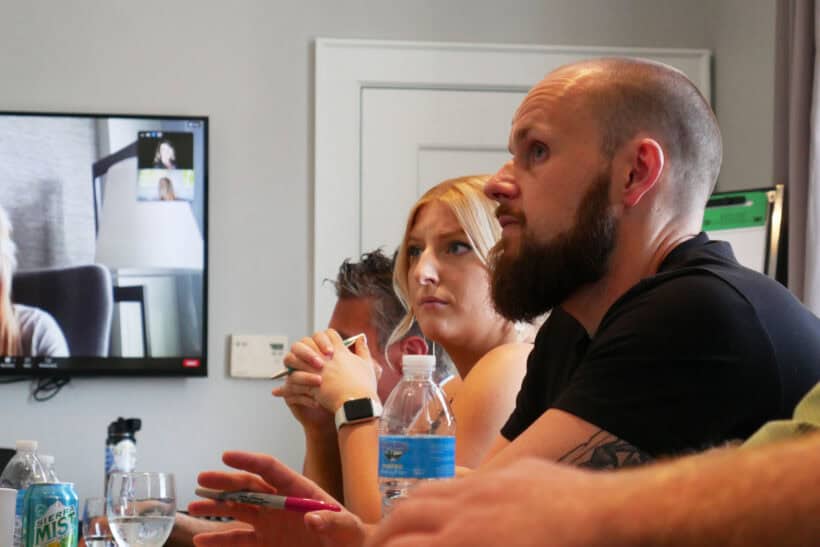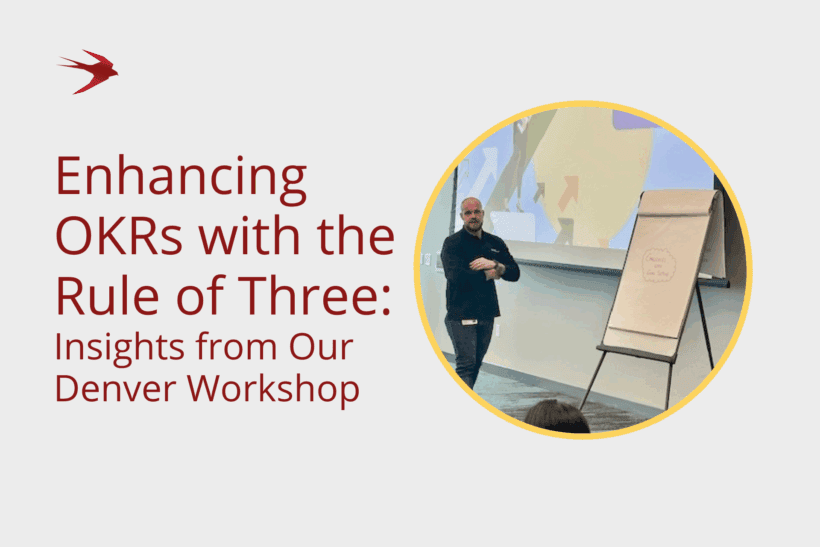As experienced coaches, we have had the privilege of coaching leaders, teams, and organisations toward achieving meaningful and transformative outcomes whether that is through the adoption of agile ways of working, professional development, or aligning strategy with execution.
We’ve seen that crafting impactful OKRs is not just about filling out templates or following frameworks—it’s about engaging in thoughtful, intentional conversations with your leaders, teams and peers. These conversations may require you to take on the role of a coach, helping others think deeply and strategically about their goals and how to achieve them.
To help you refine your OKRs with your organisations, we’ll outline how we take a coaching stance when working with companies to refine theirs. Read on for the secret sauce to OKR coaching!
Make Coaching A Habit

One of our all-time favourite coaching books, Michael Bungay Stainer’s The Coaching Habit, provides seven simple yet profound questions that can elevate the quality of any conversation in the workplace. We love to use these seven questions as a starting point, blended with some of our own favourite OKR coaching questions, to help leaders, teams, and organisations craft more impactful OKRs.
1. What is on your mind?
This is the ultimate opener. It creates space for the individual or team to bring their current challenges, aspirations, or ideas to the forefront. When applied to OKRs, it encourages a focus on what truly matters right now.
How to use this in your OKR coaching conversations:
- If you imagine looking back on this in one year, how important will this OKR be?
- What influenced your decision to prioritise these objectives?
- What makes this important right now?
By starting with these questions, you allow leaders and teams to reflect on the immediate and long-term significance of their goals, ensuring alignment with strategic priorities.
Take a step back and learn more about OKRs and their importance here.
2. And what else?
This deceptively simple question reminds us that the first answer is rarely the full story. It encourages deeper thinking and uncovers layers of insight that may otherwise go unnoticed.
How to use this in your OKR coaching conversations:
- What other factors or opportunities should we consider as we define these key results?
- What customer or stakeholder behaviours do we want to influence with these key results?
- And what else? Use this one to drive to deeper thinking.
By asking for more, you challenge teams to expand their thinking, fostering creativity and ensuring a more comprehensive approach to their OKRs.
3. What is the real challenge here for you?
This question drills down to the core issue. It’s easy to get caught up in surface-level problems, but impactful OKRs often address the root cause of challenges.
How to use this in your OKR coaching conversations:
- What is the biggest assumption you’re making about achieving this objective?
- What would have to be true to achieve this?
- What potential obstacles might prevent success, and how will we address them?
By identifying the real challenge, you help leaders and teams craft ambitious but realistic OKRs.
4. What do you want?
This question forces clarity. It’s not about vague aspirations but about articulating specific outcomes that align with broader goals.
How to use this in your OKR coaching conversations:
- How confident are you in achieving this key result, on a scale of 1 to 10? Why?
- What would success look like for this objective?
Encouraging specificity helps ensure that OKRs are inspiring, measurable and actionable.
5. If you’re saying yes to this, what must you say no to?
Every commitment comes with trade-offs. This question highlights the importance of focus and the need to say “no” to distractions.
How to use this in your OKR coaching conversations:
- By saying “Yes” to this OKR, what are you saying “No” to?
- What competing priorities need to be deprioritised?
- What will you do when competing priorities arise?
Leaders and teams often struggle with overcommitting. This question helps them sharpen their focus and allocate resources effectively.
6. How can I help? (Or how can coaching help?)
This question shifts the dynamic to collaboration. It’s about enabling rather than directing, ensuring that the individual or team feels supported in their journey.
How to use this in your OKR coaching conversations:
- What initiatives, projects, people, teams, resources, guidance, or support do you need to achieve this OKR?
- How can I help you challenge assumptions or refine your approach throughout your OKR cycle?
By positioning yourself as a partner, you empower others to take ownership while providing the support they need to succeed.
7. What is most useful or valuable here for you?
Reflection is critical to learning and growth. This question ensures that the conversation adds value and reinforces key takeaways.
How to use this in your OKR coaching conversations:
- What have you found most insightful in this discussion?
- How will this conversation influence the way you approach your objectives moving forward?
- What excites you the most from this OKR refinement session?
Closing with reflection helps solidify the insights gained and sets the stage for ongoing improvement.
Try our AI-powered strategy and OKR assessment tool to self-assess your strategy and OKR maturity.
Bringing It All Together
Effective coaching is not about providing answers—it’s about asking the right questions. When working with people on their OKRs, blending the powerful questions from The Coaching Habit with targeted OKR coaching questions creates a framework for deeper, more impactful conversations. These discussions not only help craft better OKRs but also build the capacity for strategic thinking, focus, and accountability.
As you coach your leaders, teams, and peers, remember that the quality of your questions determines the quality of their thinking. With the right questions, you can inspire them to set OKRs that drive meaningful change and lasting impact.


